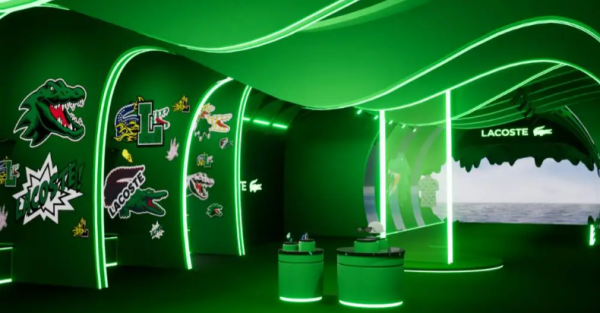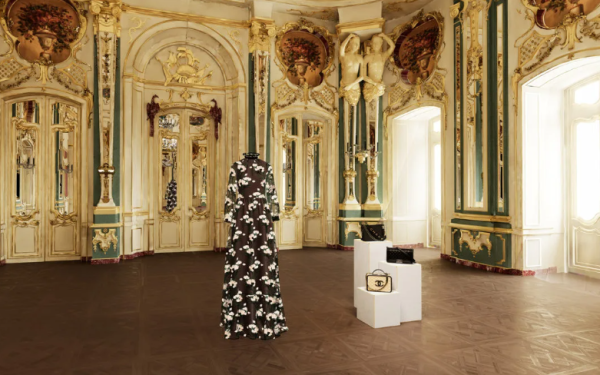Emperia Helps Fashion Brands Build VR Shopping Experiences
Virtual reality apparel shopping is becoming a thing, particularly in virtual games. The immersive retail startup Emperia wants to give brands tools with which to create virtual experiences.
Emperia has already been involved in the creation of a number of virtual stores for brands such as Lacoste, Bloomingdales, Dior, and Ralph Lauren. Emperia co-founder Olga Dogadkina has previous working in luxury retail.

Dogadkina says she wanted to create an experience that goes beyond just the transactional purchase of goods to deliver a customer journey that incorporated storytelling and the ability to deliver customer experience and product discovery that many retailers are struggling to realize in their stores.
Emperia was launched by Dogadkina and her co-founder Simonas Holcmann launched Emperia to bridge the gap between the transactional nature of buying stuff online and the “personalized shopping experience” that many brands struggle to cultivate in their stores.
The Emperia platform consists of a package of tools that can be leveraged by brands to build virtual experiences, including stories in virtual reality. The Emperia platform will integrate with existing stock management and e-commerce software, store activity, tracking demographics, and purchases.
Emperia will enable brands to put on live events with the hosts walking them through a virtual space or to customize displays and exhibits using 3D models and models and images of the brand’s real-life inventory.
Users can “visit” Emperia’s virtual spaces without having to wear a virtual reality headset. The platform is also embeddable in existing websites and can support laptops, tablets, and phones. Visitors won’t have to install an app or software to access the Emperia platform.
Emperia says it wants to leverage technology to transform virtual worlds “into the future of e-commerce” and to expand its reach to new and future online shoppers, something that will improve brand loyalty and create a completely new shopping experience. Dogadkina says Emperia is already partnering directly with the heads of e-commerce at retail companies to solve user experience, data analysis as well as online engagement challenges that have been around since the beginnings of e-commerce by giving these retailers a new solution that taps I not the virtual world’s ability to re-create or simulate in-store shopping experiences while also appealing to a new target audience that relies on their smartphones to access retail experiences.

Emperia says it collects plenty of data that many shoppers may not be willing to share. Studies have shown that metaverse and virtual reality platforms collect a lot of data that can be used to identify a person even though the data is anonymized on-device.
Dogadkina assures that Emperia is only collecting data on engagement, transactions, and demographics that provide brands with visibility on users who navigate and engage in their virtual spaces. She says the data Emperia collects is not “personally identifiable” and is only stored “for a limited time” to comply with GDPR rules.
In the future, Dogadkina says, Emperia is planning to add new verticals and better optimization tools. Her startup is also experimenting with machine learning with a focus on the use of technology in creating visuals and 360-degree videos for use in product demos.
Data shows virtual reality is increasingly being used in retail. A PwC report released in August 2022 showed that approximately a third of consumers had tried out a virtual reality app in the last six months and that out of these, 32% purchased the products they had checked out in virtual reality. Another poll of more than 2,000 U.S. shoppers in November 2022 showed that approximately 37% of the respondents were planning to shop using augmented reality and virtual reality.
According to a Deloitte survey done in September 2022, only 5% of internet users in the U.S. were expected to shop in virtual reality in the run up to the 2022 holiday season.
However, the industry is still grappling with challenges in spite of growth. Platform developers are still under various pressures. As new startups sprout, others are being sunsetted such as Microsoft’s AltspaceVR, which is one of the first VR social apps.
However, Emperia is focusing on more optimistic predictions for the industry. Although it faces stiff competition from the likes of ByondXR and Obsess, Emperia has already notched 45 customers from various sectors including fashion, luxury apparel, beauty, and sports. So far, Emperia has attracted more than $10 million in Series A investment that was led by Base10 Partners. Also participating in the funding round were Stanford Capital Partners, Daphni, Background Capital, Sony Ventures, and Concept Ventures.
By the end of 2023, Emperia is expecting to grow its workforce from its size of 40 to 120.
Dogadkina says the lockdowns during the pandemic rapidly increased the awareness of the potential of immersive and tech-powered experiences among retailers and how they can help with their sales strategy.
The immersive virtual space, she says, has evolved from the earlier gimmicky and campaign-dependent experiences into a more permanent feature in e-commerce which is now regarded as a “flagship virtual store.” Retailers bring with them solid experience, often having specific roles within that specialize and oversee the creation of such spaces to push the branding and marketing message. They also understand that the virtual space, distinct from their physical stores, presents a unique opportunity for expanding the appeal of their brands to future shoppers, Dogadkina concludes.
Source: VentureBeat
https://virtualrealitytimes.com/2023/01/26/emperia-helps-fashion-brands-build-vr-shopping-experiences/https://virtualrealitytimes.com/wp-content/uploads/2023/01/Emperia-600x375.pnghttps://virtualrealitytimes.com/wp-content/uploads/2023/01/Emperia-150x90.pngBusinessVirtual reality apparel shopping is becoming a thing, particularly in virtual games. The immersive retail startup Emperia wants to give brands tools with which to create virtual experiences. Emperia has already been involved in the creation of a number of virtual stores for brands such as Lacoste, Bloomingdales, Dior, and...Rob GrantRob Grant[email protected]AuthorVirtual Reality Times - Metaverse & VR
